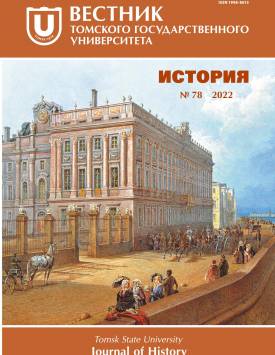Review: Binczyk E. The Age of Man: Rhetoric and Apathy of the Anthropocene. M.: New Literary Review, 2022. 209 p.
The publication is dedicated to the recently published Russian translation of the book The Age of Man: Rhetoric and Apathy of the Anthropocene by Ewa Binczyk, professor of philosophy at Nicolaus Copernicus University (Torun, Poland). The review summarizes the main themes of the work, highlights its strengths and weaknesses, and concludes by considering the role historians and their theoretical developments should play in the discussions about the Anthropocene. The review criticizes the absence of a sharply formulated thesis and a clear line of the author's argument in the text. The ideas formulated by Ewa Binczyk can hardly be called new; they rather generalize what has already been argued by other researchers in the framework of the discussion of the past decade and a half. The strengths of The Age of Man include the encyclopedic nature of the book by Ewa Binczyk. She meticulously traces the diverse discussions related to the issues of the Anthropocene and reconstructs the positions taken by the participants in these debates. Among them, Ewa Binczyk distinguishes the discourses of naturalism and post-naturalism, eco-Marxism and ecomodernism, the approaches of supporters and opponents of geoengineering, as well as the discourse of ecological catastrophe. The review also outlines what role the methods of historical science and historical knowledge in general should play in the discussions about the Anthropocene. Ewa Binczyk convincingly argues that it is the great role of the natural sciences with their exact methods that gives weight and authority to the discussions about the Anthropocene. Despite this, geologists, climatologists, physicists, and others are often stumped when it comes to the political, social, and ideological implications of their research. This problem is especially acute in the discussions about the chronology of the Anthropocene era. Various researchers attribute its beginning to the early Pleistocene, the Neolithic Revolution, the Age of Discovery, the Industrial Revolution, or the middle of the 20th century, which marked the beginning of the so-called “Great Acceleration”. Each argument has an evidence base, and the adoption of each of them as the official chronology of the Anthropocene can have dangerous political consequences for the world community. Because of this, the scientific community hesitates to make a decision. It seems that Braudel's concept of the multi-layered historical time can become a theoretical basis for a way out of this impasse. It will allow us to talk about multiple chronologies of the Anthropocene, highlight the longue duree, the level of the long duration of this era, as well as the event level. This dialectical approach will make it possible to depart from the simplified mechanistic idea of the periodization of the “age of man”. The author declares no conflicts of interests.
Keywords
Anthropocene, climate change, environmental crisisAuthors
| Name | Organization | |
| Gilmintinov Roman R. | Tyumen State University; Duke University | roman.gilmintinov@duke.edu |
References

Review: Binczyk E. The Age of Man: Rhetoric and Apathy of the Anthropocene. M.: New Literary Review, 2022. 209 p. | Tomsk State University Journal of History. 2022. № 78. DOI: 10.17223/19988613/78/25
